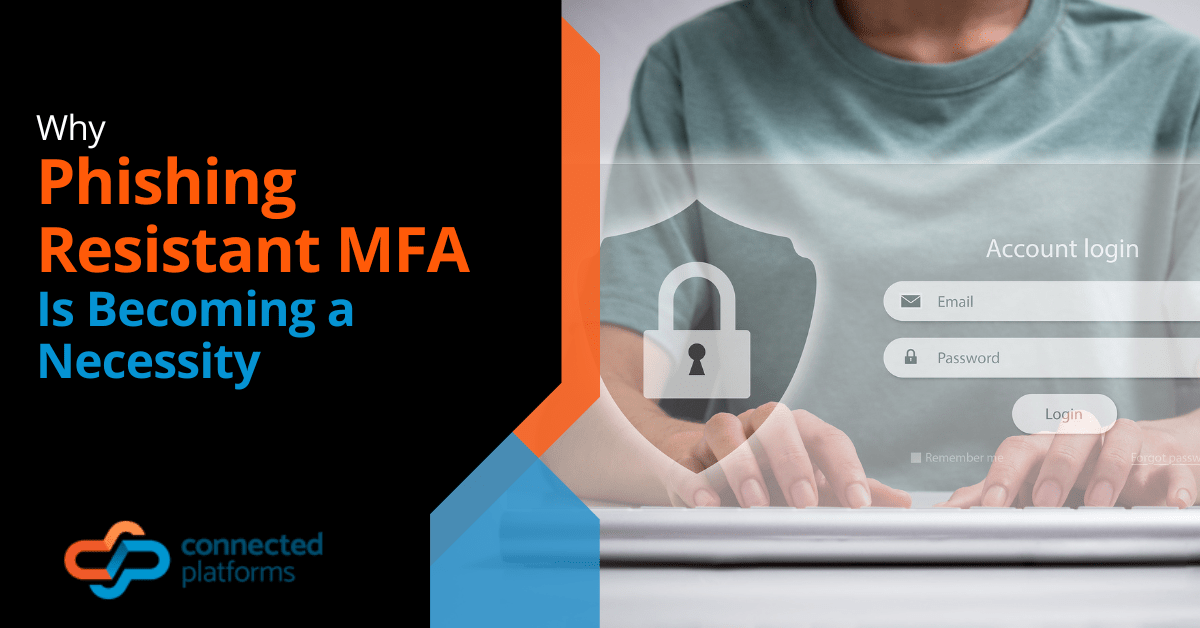It’s no secret that cybersecurity protocols are becoming more sophisticated, making it more difficult for threat actors to gain access to confidential data. As this is happening, cybercriminals are relying more and more on phishing attacks to try and gain access to personal and corporate data.
To continue to protect our valuable data, Multi-Factor Authentication (MFA) is becoming an essential tool in this fight against phishing and other cyber threats.
Let’s take a closer look at MFA and its relatively new upgrade, phishing-resistant MFA, and why they are becoming necessary to protect our data.
What Is MFA?
When used properly, multi-factor authentication gives an extra layer of security to our log-ins. It works much like normal logins, where users enter their username and password, but then it adds an additional authentication factor. This additional factor can be anything from a one-time password (OTP) sent to a device, biometrics like facial recognition or fingerprint scanning, or even a hardware token.
These extra layers help to ensure that the person accessing an account or confidential data is the actual owner. MFA helps to protect against stolen passwords and other cyber threats.
What Is Phishing-Resistant MFA?
Phishing-resistant MFA is a variant of regular MFA that is specifically designed to protect against phishing attacks. Phishing is a type of cyberattack where attackers send fake emails or texts that appear to be from a legitimate source, in an attempt to trick the recipient into revealing sensitive information or clicking on malicious links.
Phishing-resistant MFA takes MFA one step further by removing people from the equation altogether and using hardware tokens.
The two main types of phishing-resistant MFA include:
- FIDO/ WebAuthn authentication
- Public key infrastructure (PKI)-based authentication
FIDO/ WebAuthn authentication uses a hardware token, such as a security key or a smart card, that is connected to the user’s device. This hardware token generates a one-time use key that is used to authenticate the user’s login. This means that even if a phisher can obtain the user’s username and password, they would not be able to access the account without the hardware token.
PKI-based authentication also uses a hardware token, but it generates a digital certificate that is used to authenticate the user’s login. This certificate is only valid for a certain amount of time, and once it expires, a new one must be generated. This means that even if a phisher can obtain the user’s digital certificate, it will be invalid once it expires.
Why Is Phishing-Resistant MFA Necessary?
Phishing attacks are becoming more and more sophisticated, and have significantly increased in volume, making them more difficult for traditional MFA methods to protect against. With phishing-resistant MFA, businesses can have an extra layer of security that helps them protect their confidential data from these types of attacks.
Some benefits of phishing-resistant MFA include:
- Increased security: Phishing-resistant MFA adds an extra layer of security that makes it harder for threat actors to gain access to confidential data.
- Cost savings: Being more secure than traditional authentication methods, businesses can save money by not having to invest in other security measures.
- Easier to use: This implementation of MFA is much easier to use than traditional authentication methods, making it more secure and less time-consuming.
While these are just some of the benefits of phishing-resistant MFA, the most important benefit is that it helps protect businesses from data breaches and the negative effects that come with them.
Adopting Phishing Resistant MFA In Your Organization
Adopting phishing-resistant MFA is the best way to ensure that valuable data is protected from malicious actors. Doing so will help businesses reduce their risk of a data breach and ensure compliance with regulatory requirements.
Organisations should assess their current security posture and determine how much risk they are exposed to. Once this assessment is complete, they should consider where and when it’s best to begin incorporating phishing-resistant MFA into their security protocols.
Looking To Get Quality Managed IT Services in Brisbane? Let Connected Platforms Help!
Phishing-resistant MFA is becoming an essential security measure for organisations looking to protect their data from malicious attacks. It is a cost-effective, user-friendly solution that can help organisations reduce the risk of a data breach and ensure compliance with regulatory requirements.
Take the first step towards enhanced security by adopting phishing-resistant MFA in your organisation today!
We can provide you with a comprehensive assessment of your organisation’s cybersecurity standings and help develop a strategy to help you stay one step ahead of the curve when it comes to data safety in Brisbane, Australia.
Contact us today for a free security consultation or to find out more about other IT solutions we can help you with. Call (07) 3062 6932 or book a coffee meeting online.




